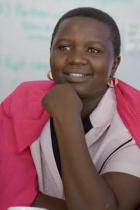Lydia Carolyn Cherop

Uganda, 2011
Executive Director and Founder, Women Integrated Initiative for Development
Lydia Carolyn Cherop is a 2011 HRAP graduate from Uganda. She is the executive director of Women Integrated Initiative for Development, an organization that she founded to help rural women. The organization currently provides technical assistance to more than 100 women in carrying out their local initiatives. Lydia volunteers to assist the Uganda Human Rights Commission, a national human rights institution, where she runs the Kapchorwa field office.
“HRAP built my capacity in human rights advocacy and exposed me internationally. I come from a rural community where few people are exposed internationally. I can now relate to issues globally,” she says.
Lydia did not have the opportunity to spend her childhood in her home country, Uganda. “As a girl,” she tells, “I lived with my parents in exile in Kenya but didn’t know why.” Her parents hid their identities while in exile -- she wasn’t even aware of their real names at the time. After her father returned to Uganda, joined politics and helped Lydia and her family to return to Uganda, Lydia says, “I began to live my real life. I went to school and saw a future.”
Her challenges had not ended though. Growing up, Lydia was faced with calls from her grandmother that she be circumcised and prepare for marriage. “I said no to her,” she tells, and after earning her diploma, “I started working in radio where I talked about the rights of women and girls and at the same time raised money for my university degree.”
Lydia earned a master’s degree in development studies at Uganda Martyrs University with a scholarship from Irish Aid Uganda. “Education in human rights opens doors to other rights,” she says, “but rights are still lacking. The difference between illiterate and literate women is a change in suffering.” Lydia started an organization called Women Integrated Initiative for Development that promotes and protects the rights of rural women and girls.
Lydia continues to look ahead to three goals: reducing poverty among women, realizing the rights of women, and educating girls. “I am enlightened and can recognize human rights gaps,” she says, “because I am educated. I can understand human rights, but most women, unless educated, do not.” Lydia is aware that the achievements that she has made not only for herself but for many other women through human rights advocacy have rendered her a respected leader in her community, which continues to motivate her. “My parents are so proud of me,” she says. “My community honors me because I am a better person. This drives me to help them.”
- Article updated by Chiora Taktakishvili, Fulbright Exchange Visitor, July 2019






